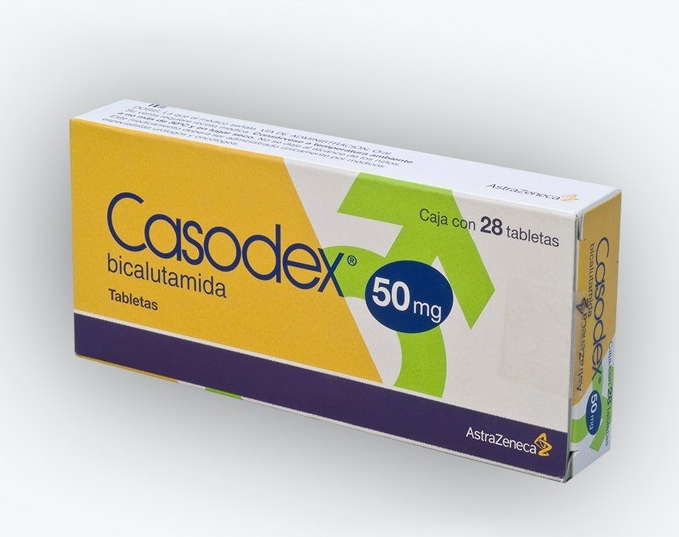Bicalutamide (Casodex) is an anti-androgen drug that inhibits the binding of testosterone and dihydrotestosterone to its receptors. It is used to treat the following conditions:
-
-
Therapy of stage D metastatic prostate cancer in blend with an LHRH ( Luteinizing hormone-releasing hormone) agonist.
-
Therapy of locally advanced prostatic cancer as monotherapy (Off Label Use).
-
Bicalutamide (casodex) Dose in Adults
Bicalutamide (Casodex) in the therapy of metastatic Prostate cancer:
- 50 mg orally once a day in combination with an LHRH analog.
Off-label use in the therapy of locally advanced Prostate cancer including those at a high risk of recurrence.
- 150 mg orally once every day as monotherapy
- If a dose is missed, take the next dose at the next scheduled time. Do not double the next dose.
Use in Children:
Not applicable
Pregnancy Risk Factor X
- It is not suggested for women.
- Anti-androgens can adversely impact fetal development.
- It can also impact male fertility.
- Effective contraception should be used by male and female partners of reproductive age to prevent pregnancy.
Use during breastfeeding:
- It is contraindicated for women, especially during breastfeeding.
Bicalutamide dose in Renal Disease:
- Adjustment in the dose is not required.
Bicalutamide dose in Liver Disease:
-
Hepatic impairment at baseline:
- Adjustment in the dose is not required.
- Patients with moderate to severe hepatic impairment should use the drug with caution.
-
Hepatic impairment during treatment:
- Discontinue immediately if the ALT is more than twice the upper limits of normal or the patient develops jaundice.
Adverse reaction percentages are reported as part of a combination regimen with an LHRH analog unless otherwise noted.
Common Side Effects of Bicalutamide (Casodex):
-
Hematologic & Oncologic:
- Anemia
-
Cardiovascular:
- Peripheral Edema
-
Endocrine & Metabolic:
- Hot Flash
- Gynecomastia
-
Central Nervous System:
- Pain
-
Gastrointestinal:
- Nausea
- Diarrhea
- Constipation
- Abdominal Pain
-
Genitourinary:
- Pelvic Pain
- Hematuria
- Mastalgia
- Nocturia
-
Infection:
- Infection
-
Respiratory:
- Dyspnea
-
Neuromuscular & Skeletal:
- Back Pain
- Weakness
Less Common Side Effects of Bicalutamide:
-
Hepatic:
- Increased Liver Enzyme
- Increased Serum Alkaline Phosphatase
-
Cardiovascular:
- Myocardial Infarction
- Syncope
- Chest Pain
- Cardiac Arrest
- Cardiac Failure
- Hypertension
- Angina Pectoris
- Coronary Artery Disease
- Edema
-
Hematologic & Oncologic:
- Gastrointestinal Carcinoma
- Rectal Hemorrhage
- Skin Carcinoma
-
Central Nervous System:
- Dizziness
- Paresthesia
- Myasthenia
- Anxiety
- Headache
- Insomnia
- Chills
- Confusion
- Nervousness
- Neuropathy
- Drowsiness
- Hypertonia
- Depression
-
Dermatologic:
- Skin Rash
- Pruritus
- Xeroderma
- Diaphoresis
- Alopecia
-
Endocrine & Metabolic:
- Weight Loss
- Decreased Libido
- Dehydration
- Hyperglycemia
- Weight Gain
- Gout
- Hypercholesterolemia
-
Gastrointestinal:
- Flatulence
- Vomiting
- Dyspepsia
- Anorexia
- Dysphagia
- Periodontal Abscess
- Xerostomia
- Hernia
- Melena
-
Genitourinary:
- Urinary Urgency
- Urinary Incontinence
- Urinary Tract Infection
- Urinary Retention
- Dysuria
- Impotence
- Difficulty In Micturition
-
Infection:
- Herpes Zoster
- Sepsis
-
Neuromuscular & Skeletal:
- Ostealgia
- Arthritis
- Neck Pain
- Pathological Fracture
- Leg Cramps
- Myalgia
-
Ophthalmic:
- Cataract
-
Renal:
- Polyuria
- Increased Serum Creatinine
- Hydronephrosis
- Increased Blood Urea Nitrogen
-
Miscellaneous:
- Cyst
- Fever
-
Respiratory:
- Pneumonia
- Rhinitis
- Cough
- Pharyngitis
- Asthma
- Epistaxis
- Flu-Like Symptoms
- Bronchitis
- Sinusitis
Contraindications to Bicalutamide:
- Use in women
- Pregnancy
- Allergic reactions to bicalutamide and any component of this formulation
- Children
Warnings and Precautions
-
Gynecomastia
- Higher doses can cause breast pain and gynecomastia.
-
Hematologic:
- It is important to monitor CBC regularly as anemia could result from testosterone suppression.
-
Hypersensitivity
- Rarely, urticaria or Angioneurotic edema can occur.
-
Hepatotoxicity:
- Hepatotoxicity can occur in the first three to four months of therapy. It may lead to serious complications that could require discontinuation of therapy.
- Patients with moderately severe or mild liver disease should be cautious when taking the drug.
- It is important to monitor the patient for signs and symptoms of hepatotoxicity.
- It is important to monitor the liver functions regularly and stop treatment if ALT exceeds twice the normal limit.
-
Interstitial lung disease:
- It is important to monitor patients for any worsening respiratory symptoms such as cough, fever, or shortness of breath. Interstitial lung disease has been reported in some cases.
-
Cardiovascular disease
- Monitor ECG, Echocardiogram, electrolytes, and ECG periodically as androgen deprivation therapy can increase cardiovascular disease risk.
-
Reduced bone mineral density
- It can lead to osteopenia or osteoporosis and increase the risk of bone fractures.
-
Diabetes:
- Patients with diabetes may experience a decrease in glucose tolerance or loss of glycemic control.
Bicalutamide: Drug Interaction
Risk Factor C (Monitor therapy) |
|
|
Aminolevulinic Acid (Topical) |
Photosensitizing Agents may enhance the photosensitizing effect of Aminolevulinic Acid (Topical). |
|
ARIPiprazole |
CYP3A4 Inhibitors (Weak) may increase the serum concentration of ARIPiprazole. Management: Monitor for increased aripiprazole pharmacologic effects. Aripiprazole dose adjustments may or may not be required based on concomitant therapy and/or indication. Consult full interaction monograph for specific recommendations. |
|
Choline C 11 |
Antiandrogens may diminish the therapeutic effect of Choline C 11. |
|
Dofetilide |
CYP3A4 Inhibitors (Weak) may increase the serum concentration of Dofetilide. |
|
Flibanserin |
CYP3A4 Inhibitors (Weak) may increase the serum concentration of Flibanserin. |
|
NiMODipine |
CYP3A4 Inhibitors (Weak) may increase the serum concentration of NiMODipine. |
|
Porfimer |
Photosensitizing Agents may enhance the photosensitizing effect of Porfimer. |
|
Verteporfin |
Photosensitizing Agents may enhance the photosensitizing effect of Verteporfin. |
|
Vitamin K Antagonists (eg, warfarin) |
Bicalutamide may increase the serum concentration of Vitamin K Antagonists. Specifically, free concentrations of the vitamin K antagonists may be increased. |
|
Risk Factor D (Consider therapy modification) |
|
|
Lomitapide |
CYP3A4 Inhibitors (Weak) may increase the serum concentration of Lomitapide. Management: Patients on lomitapide 5 mg/day may continue that dose. Patients taking lomitapide 10 mg/day or more should decrease the lomitapide dose by half. The lomitapide dose may then be titrated up to a max adult dose of 30 mg/day. |
Risk Factor X (Avoid combination) |
|
|
Aminolevulinic Acid (Systemic) |
Photosensitizing Agents may enhance the photosensitizing effect of Aminolevulinic Acid (Systemic). |
|
Astemizole |
Bicalutamide may increase the serum concentration of Astemizole. |
|
Cisapride |
Bicalutamide may increase the serum concentration of Cisapride. |
|
Indium 111 Capromab Pendetide |
Antiandrogens may diminish the diagnostic effect of Indium 111 Capromab Pendetide. |
|
Pimozide |
CYP3A4 Inhibitors (Weak) may increase the serum concentration of Pimozide. |
|
Terfenadine |
Bicalutamide may increase the serum concentration of Terfenadine. |
Periodically Monitor:
- CBC
- ECG
- echocardiogram
- prostate-specific antigen (PSA)
- Serum testosterone
- luteinizing hormone
- Liver function tests (at baseline and regularly in the first four months)
- Blood glucose in patients with diabetes.
- Monitor INR in patients on warfarin.
How to take Bicalutamide (Casodex)?
- It is taken orally at the same time each day (either in the morning or in the evening). It may be administered with or without food.
- It should be started concomitantly with an LHRH ( Luteinizing hormone-releasing hormone) analog for the treatment of metastasis.
Mechanism of action of Bicalutamide (Casodex):
- It prevents the growth of prostate cancerous cells with testosterone by competitively inhibiting testosterone and dihydrotestosterone binding to the androgen receptors.
International brand names of Bicalutamide:
- ACH-Bicalutamide
- ACT Bicalutamide
- APO-Bicalutamide
- Casodex
- DOM-Bicalutamide
- JAMP-Bicalutamide
- MYLAN-Bicalutamide
- PHL-Bicalutamide
- PMS-Bicalutamide
- PRO-Bicalutamide-50
- RAN-Bicalutamide
- SANDOZ Bicalutamide
- TEVA-Bicalutamide
- VAN-Bicalutamide
- Androdex
- Areclok
- Bicadex
- Bical
- Bicalan
- Bicalox
- Bicalude
- Bicapros
- Bicatero
- Bicatero 50
- Bicloc
- Bidrostat
- Bikalen
- Biprosta
- Bosconar
- Bypro
- Calumid
- Calutex
- Calutide
- Calutide-50
- Calutol
- Cosamide
- Diproca
- Gepeprostin
- Lutam
- Lutamidal
- Procalut
- Talum
- Tosadex
- Vicalud
- Yonistib
- Zolacos CP
Bicalutamide Brand Names in Pakistan:
Bicalutamide Tablets 50 mg |
|
| Calutide | A. J. Mirza Pharma (Pvt) Ltd |
| Casodex | ICI Pakistan Ltd. |




